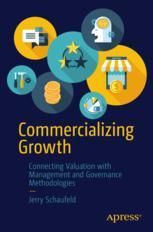Info Pros’ Role in Supporting Growth
The growth of an enterprise is a multi-stakeholder process. As info pros and librarians sit at the heart of the organizations in which they operate - bringing together resources, ideas and people - it comes as no surprise that they have an important role to play. Mary Ellen Bates spoke with Jerry Schaufeld, Affiliate Professor of Practice at the Worcester Polytechnic Institute’s Business School about his most recent book, Commercializing Growth: Connecting Valuation with Management and Governance Methodologies, and the ways info pros can contribute to their organization’s strategic goals. She summarizes the discussion below.
When I spoke with Jerry Schaufeld, I was struck by the challenges organizations face in measuring their value and monitoring the internal and external factors that affect their growth. Identifying competitive pressures, understanding changes in market demographics, monitoring regulatory changes, and tracking other risk factors affecting an organization are essential aspects of strategic governance.
While Schaufeld did not address the role of librarians and information professionals directly in Commercializing Growth, he offered a number of thoughts during our conversation on the need for proactive initiatives by info pros to support the growth of an enterprise. He observed that there is often a disconnect between value and the ongoing operations of an organization; leaders often need ongoing monitoring of the factors that affect the valuation—and therefore the value—of the organization.
Organizing roundtables to meet current and anticipated needs
Schaufeld was adamant about the importance of info pros being fully engaged in all aspects of an enterprise and seeing themselves as playing an essential part in the success of the enterprise. Why not offer workshops for middle managers, for example, highlighting the library’s online information sources and new book acquisitions, he asked. Similarly, public and university libraries could organize periodic roundtables of local CEOs, providing an environment for them to identify common interests and challenges, and build strategic relationships. A library could invite a local university professor or business leader to meet with an organization’s leaders to keep them updated on an emerging trend or industry development. In fact, Schaufeld noted, fostering these kinds of gatherings would also enable the library to conduct a roundtable discussion with stakeholders about the future of the library in the next ten years, which would help drive the needed investment in resources and staff for the library to succeed and meet the current and anticipated needs of the organization.
Monitoring external factors and adaptive corporate culture
In Commercializing Growth, Schaufeld made note of the wide range of external risks faced by any organization, as well as approaches to mitigate those risks. Virtually all the mitigation strategies involve the kinds of strategic research in which librarians and information professionals excel. Supply chain fluctuations can be mitigated by identifying alternative suppliers and constant monitoring of environmental factors, for example. Competitive changes can be addressed by research to identify product adaptations and new marketing approaches. Disruptive innovation can be detected early with well-designed news and social media monitoring services. Global economic and geo-political trends often affect organizations far removed from international commerce, and the global information resources available to librarians and info pros can help keep strategic decision-makers apprised of international trends. Nimble management tactics are required to counter these external factors that organizations are affected by and cannot directly address, and providing decision-ready information to leaders is a critical role for libraries and information centers.
In addition to addressing external conditions, agile organizations encourage an adaptive corporate culture—another area where libraries often play a significant role. Among the tools used to support employee responsiveness in a dynamic environment are in-house training and seminars, identifying opportunities to bring in more diverse perspectives, and supporting the organization’s employee retention initiatives such as continuing professional development.
The library as a business proposition
Schaufeld emphasized the importance of seeing the library as a business proposition—one that merits and needs specific resources in order to accomplish its goals—and the importance of knowing what the library’s mission is and where it can make the biggest difference in the organization it serves. The information landscape is changing at a breathtaking rate; the library needs to ensure that the organization’s decision-makers continue to have the right tools to support creative thinking and enable informed decisions. Just as critical, however, is the importance of librarians and info pros communicating with the library stakeholders about the contributions they are making to the enterprise and the resources they need to support those contributions.
Libraries play an important role in the health and vibrancy of the community or enterprise in which they operate. They can continue expanding their impact by facilitating conversations among stakeholders and user groups, by exploring new ways to tailor their information services to the changing needs of their organization and environment, and by continually aligning the library’s mission and operations with the strategic goals of the organization.
 About Jerry Schaufeld
About Jerry Schaufeld
Affiliate Professor, Professor of Innovation, Entrepreneurship, Technology Commercialization, and Early-Stage Investment Capital Emeritus at Worcester Polytechnic Institute (WPI) Business School. For the past 15 years, he has taught at the Foisie School of Management at WPI in the area of new venture creation, innovation and entrepreneurship, technology commercialization, and the acquisition of capital in early-stage ventures. He consults for three venture capital firms and is currently doing research in the area of entrepreneurship models for universities.
In addition, he has taught graduate-level new venture dynamics in Switzerland (and other international locations, including China, Denmark, and Greece) and is currently working with a research team at the Neaman Institute at the Technion in Israel on the topic of improving the efficiency of the investment process. He is the author of Commercializing Growth.



